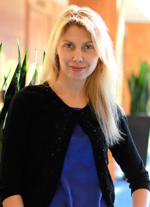Turkish scientist takes part in an award winning project to make electrical service in New York City more reliable
A team of applied mathematicians and computer scientists won the Innovative Applications in Analytics Award from the INFORMS organization for the project, “Analytics for Power Grid Distribution Reliability in New York City.” The project is directed from MIT and conducted in conjunction with researchers from MIT, Columbia University and Con Edison, NYC’s power company. Dr. Seyda Ertekin, who joined MIT in 2010, is part of the MIT team. The award was presented at the INFORMS Conference on Business Analytics & Operations Research, held in San Antonio, Texas, April 7-9.
Machine Learning, a sub-discipline of Artificial Intelligence, has emerged as a highly promising field for predicting the future by discovering and using the hidden information in the data. Dr. Seyda Ertekin and the research team that she is part of at MIT designs and develops machine learning algorithms to predict serious and dangerous events that can occur in the electrical grids. Dr. Ertekin is one of the two researchers at MIT who works on this project, and along with the director of the project, she is responsible for the design and formulation of the algorithms and the analytical techniques as well as the implementation and the development of the software to work with the real data. “The order in which the electrical grid’s parts are inspected is critical to preventing fires, explosions and power failures; the most vulnerable structures should be inspected and repaired with the highest priority before a serious event occurs in order to ensure public safety and economic stability and prevent the costly repair-work after an event” says Dr. Ertekin.
The purpose of the Innovative Applications in Analytics Award is to recognize creative and unique developments in theoretical and applied analytical techniques. The award promotes the awareness of the value of analytics in unusual applications that have high societal impact and/or business value. Following multiple rounds of judged presentations in the past year, the winning team prevailed over a competitive list of 40 submissions, 10 semifinalists and two other finalists. In the award ceremony, the winning project is presented as the first major effort to use machine learning and data mining for preemptive maintenance and repair of an electrical distribution network and is a large-scale multi-year effort between scientists at MIT and Columbia University and engineers from Con Edison, which operates the world’s oldest and largest underground electrical system.
“Most power grids in US cities have been built gradually over the last 120 years. This means that the electrical equipment vary in age; for instance, there are high voltage distribution cables installed during the Thomas Edison era in NYC that are still in service.” explained Dr. Ertekin. “Additionally, the size of the grid is massive; in NYC alone, there are enough cables to wrap around the earth three and half times.” “Therefore, it is impossible to renew the infrastructure overnight,” said Dr. Ertekin. “Converting to a smart grid is considered to be similar to replacing worn parts of an airplane while it is in the air,” she noted. “As grid parts are replaced gradually and as smart components are added, the old components will still need to be maintained.” “Machine learning methods are very suitable for working with this kind of massive and historical electrical grid data to prevent hazardous events in the cities,” Dr. Ertekin concluded.
Seyda Ertekin, received her B.S. degree in Electrical & Electronics Engineering in Orta Dogu Teknik Universitesi and her Ph.D. degree in Computer Science & Engineering at the Pennsylvania State University – University Park. Her research has been widely published in top tier academic journals and conference proceedings. Her recent work on computational methods to predict power failures in electrical systems will be presented in the summer at the late-breaking developments session at the AAAI Conference on Artificial Intelligence in Bellevue, WA and as an invited talk at the Joint Statistical Meeting in Montreal, CA.
